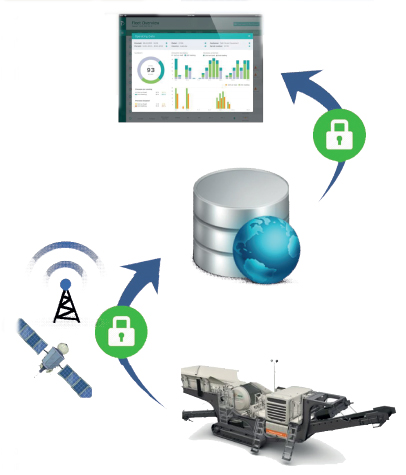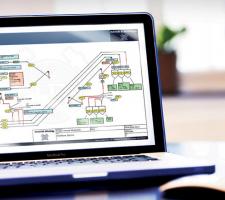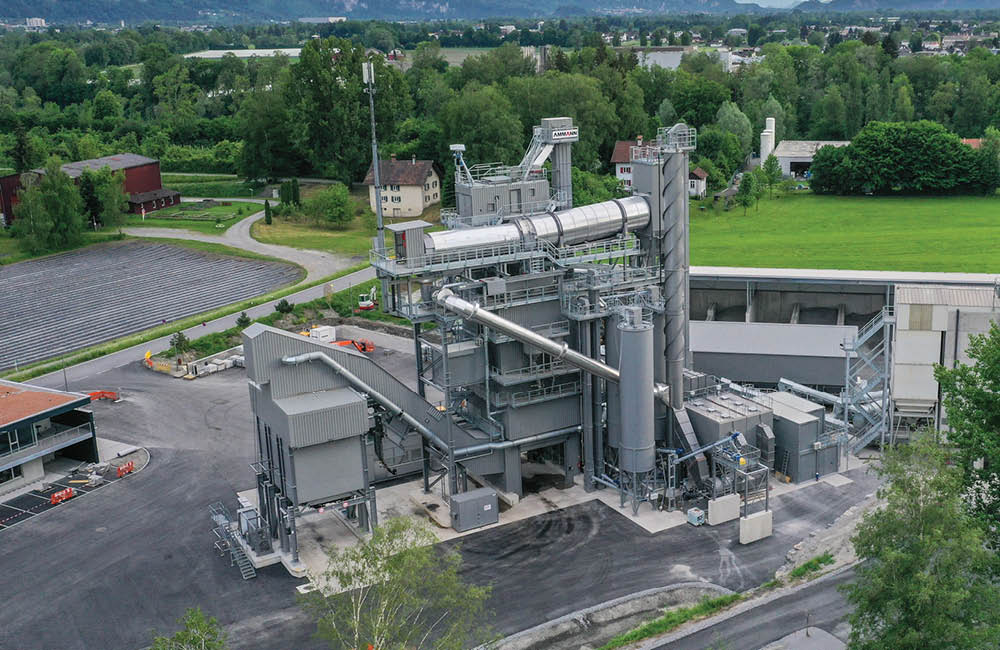
The installation of proficient plant automation in quarries across the world is generating big cost savings through improved operational efficiency. Guy Woodford reports on some of the latest solutions.
Quarry Automation Software. By working with Command Alkon, Longcliffe is said to be able to increase the efficiency of its daily operations and therefore optimise the service it offers its customers.
Transport planning is an essential activity as Longcliffe seeks to ensure timely delivery of products whilst reducing the costs of transportation. Mick Barkley, director of sales at Longcliffe, explains: “Command Alkon’s Quarry Automation Software enables our planners to oversee the planning activities by means of a quick and simple order entry system and useful planning boards.”
Longcliffe planners benefit from real-time overviews of pick-up schedules that indicate where possible bottlenecks occur.
The Vehicle/Order Dispatch and Local Dispatch modules on Command Alkon’s Quarry Automation Software allow users to plan, schedule and track loads and deliveries from the plant location to customers.
These functions are said to allow Longcliffe to provide up-tothe- minute detail to customers enquiring about their orders, as well as optimise efficiency in this crucial area of the firm’s business.
As part of its Command Alkon quarry automation software package, Longcliffe has recently implemented a Radiofrequency Identification (RFID) kiosk to streamline the check-in process to its quarry. Drivers can enter the location, via a ‘fast track’ lane; swipe their card and receive product/loading directions into the quarry. This check-in process integrates with a tablet in their loading shovels so the loader knows exactly what truck, product and target weight to load. The loading shovel and weighbridge staff can see exactly how many trucks are in the quarry and for how long. This streamlines the ticketing process on the outbound scale; reducing both overloading and underloading. The Command Alkon software is equipped with a Ticketing Module which records point-of-sale transactions based on readings from the digital scale indicator. Ticketing is also used to create manually entered transactions for deliveries of multiple weighed products through the miscellaneous ticket screen. Features include multiple units of sale, bulk and bagged goods, along with tracking of freight and material quantities.
Barkley adds: “The Automation Software provides timely and accurate operational information which operates as a support tool to enhance the decision-making of our staff.
“With Command Alkon we have made an investment for the long term. We’re also looking into the possibilities of Command Alkon’s mobile solutions.”
Longcliffe extracts, processes, stores and transports over 5,000tonnes of product every working day with 99% of production scheduled for delivery the following day, if not the same day. Deliveries are made all over the UK, in all weathers, 365 days a year, and, when necessary, 24 hours a day.
Customers can see and compare data from their Metso Lokotrack mobile crushing fleet through the new plant automation tool, enabling them to deal with low utilisation and performance more effectively.
Comparable data covers key areas including fuel consumption, effective and non-effective machine hours, and production statistics from belt scales.
Metso Metrics also allows customers to see when scheduled maintenance is required, and is said to make spare part and maintenance package ordering easy. The tool also offers remote expert recommendations from Metso’s specialist on how to improve your Metso fleet’s performance.
Coming with a modern, easyto-use, web-based user interface, Metso Metrics offers secure collection and storage of data on a cloud database, and works off an Iridium satellite network available almost anywhere in the world. It also comes with a terrestrial mobile network option.
Usefully, Metso Metrics comes with no maximum history of data points, aiding customer’s detailed, long-term performance and efficiency analysis.
Customers can create as many users of the tool as required, with reports on machine information, such as hours and alarms, generated and sent by email daily, weekly or monthly.
Reports can also be downloaded in different formats.
“We currently offer Metso Metrics for our Lokotrack mobile models, but in a short time we’ll be offering it for our stationary crushers,” Janne Kytökari, Metso’s global director, Monitoring and Control. “The initial feedback we’ve had from customers has been very positive, especially from those who used our previous system. They like the fact that Metso Metrics processes data faster.
“We are developing our analytics capability more and more, refining the data sent from the field to the customer.
Data transmitted by satellite is expensive, so we are also developing our ability to send data through mobile networks. This allows us to send vast volumes of data compared to the satellite, whilst also expanding the scope of what we are collecting.
Customers tell us they want more frequent data, including, in some instances, on a minute-byminute basis.
“Aggregates-processing data analysis is becoming more important to every quarrying business, and Metso Metrics is just the beginning of what we can offer. The aggregates sector can also benefit from taking on board what is being done with plant automation in the mining sector.”
Haver & Boecker, a leading equipment manufacturer and solutions provider in aggregates and mining, has launched NIAflow plant simulation software. NIAflow helps producers optimise quarry and mine operations by diagramming plant flow, machine placement, product pre-calculations and more.
The Canadian company featured NIAflow at MINExpo International in Las Vegas, US. (26-28 Sep 2016).
NIAflow, says
Its intuitive menu control makes it easy for all levels of experience, and Haver & Boecker provides several levels of training, if needed.
These can be group, company or even individual training sessions.
“As part of our ongoing efforts to optimise plant efficiency for our customers, we are constantly developing innovative machines, programs and software to help them be successful,” says Karen Thompson, president of Haver & Boecker Canada. “NIAflow will serve as a cornerstone in the development of process engineering projects. When paired with other Haver & Boecker technology, such as Pulse vibration analysis software, our customers will hold all of the tools they need to optimise process flow and increase productivity and profits.”
NIAflow is said to allow users to analyse more than 90 different process equipment pieces, from crushers and vibrating screens to material washers and conveyers.
Beyond equipment, the system uses scientific-based methods to monitor the operation’s input, output and waste piles. The program calculates the mass and volumetric flow rates as well as the valuable content with machine-specific operating parameters, preventing plant bottlenecks before equipment is in place.
“NIAflow will significantly impact the efficiency and profitability of our mineral processing customers,” said Joachim Hoppe, Haver & Boecker Mining general manager. “The thought process behind this software development was to give our partners tools to closely monitor their plant set-up as a whole, allowing them to identify problems and plant bottlenecks. NIAflow helps producers discover the most efficient set-up for existing equipment as well as determine equipment needed to enhance productivity and increase production.”
A new
Like the first Ma-estro installation for Beton Lana, the new plant automation system uses Ma-estro’s production data software (Q-Production), maintenance management system (Q-Maintenance) and optimisation production system (Q-Automation). As with its Lana quarry application, it is used at Bressanone quarry to optimise the production of aggregates for use in concrete-based applications by Beton Lana and another firm, Progress. The Bressanone plant has a primary, secondary and a tertiary crushing line, a washing line and a mud treatment section.
“We use the software forremote monitoring of the two plants’ performance. This allows us to immediately interfere in case of malfunctioning and guarantees the best performance from the plants in terms of productivity, reliability and production quality, at the minimum possible level of energy consumption,” explainsChristian Grünfelder, of Beton Lana.
“The systems are used by the plant operators, the plant managers and the administration departments. Through the systems, we check daily production, cost of maintenance and quality of the products. We also gain accurate production cost per tonne, and after each production run we can check the overall efficiency of the plants.”
Grünfelder says Beton Lana’s decision to invest in a second Ma-estro plant automation solution was due to the success of the “reliable” and “easy-to use” previous solution which, he says, significantly reduced Lana quarry’s cost per material tonne, while also providing vital detailed analysis of all production costs.
“Good management requires accurate control,” he continues.
“Before the installation of the Ma-estro system at Lana quarry, we couldn’t access clear and immediate information.
Assessing production cost had to be made over a much longer period of time, and the quality and production flow was not constant.”
Grünfelder admits that he and Beton Lana colleagues were a bit sceptical at first on the benefits of installing the first plant automation system at Lana quarry. But the firm, he says, has been rewarded for trusting in Ma-estro’s competency and vision.
“With the first Ma-estro plant automation system at Lana quarry we increased production by about 25%, while also generating average production cost savings of €0.45 per tonne. We’re still assessing the full impact of the latest plant at Bressanone.” Of Ma-estro’s response to any technology solution servicing/ repair needs, Grünfelder says:
“We subscribe to an annual service where we have teleassistance from Ma-estro. Any problems are usually solved in a very short time.
“We needed guaranteed results before making the investment in the new Ma-estro plant automation system, and we know we can trust the company.
Nowadays, there is no space for mistakes, and we have seen with the first plant solution that the return on investment is very fast.”
Cash-saving plant automation
Ma-estro CEO Giorgio Manara outlines why he thinks plant automation is the key to achieving optimal aggregate production efficiency at the lowest possible cost.
“Today, large quarrying companies already have their own department to develop automation systems. What they don’t normally have is the capability to intervene analytically and to process all the information needed to calculate an accurate production cost. Concurrently, small and medium quarrying companies normally cannot afford a dedicated automation department.
In both the above cases, this is where specialist automated quarry plant solution companies such as Ma-estro can help find a bespoke solution. Quarries tend to work with very variable materials; materials which put machines under varying degrees of stress, thus affecting the production capacity of each machine. Such variables can raise or lower production costs by up to 30%. Another influence on production costs is the capability to push a quarry materials processing plant to its real production limit without overloading. This is something almost impossible for an operator to do manually.
Average aggregates production costs (not
considering loading and transport) can be divided
as follows:
Screens and conveyors 11%
Crushing machines 23%
Maintenance (ordinary + extraordinary) 16%
Energy 31%
Staff 13%
Sludge treatment 6%
As we see from above, the highest cost is energy. On average, to produce a tonne of material requires 2.5kWh. However, in some cases this figure can reach or even exceed 5kWh/tonne.
Furthermore, a plant without good management can normally waste about 20% of energy. Doing a quick calculation, this means that in a medium size quarry – producing about 400,000tonnes/year – more than 250,000 kWh of energy can be wasted every year. This makes it essential to monitor and control energy usage if you want to optimise your overall quarry production process.
A Ma-estro plant automation system checks all the above costs in real time (every 5 seconds) and interferes continuously with the production process. The system uses special sensors installed on all the production machine fleet which are controlled by dedicated algorithm software. Crushers, for instance, are controlled by a special radar level sensor which ‘reads’ the quantity of material inside the crushing chamber. In this way, the crusher always works with the perfect amount of material (about 75% of the height of the jaws), producing the material with the best possible energy consumption, while also improving final aggregate product shape of the aggregate.
In addition to the crushing machines, the Ma-estro system controls conveyors and screens and other equipment used for aggregate washing and sand treatment (hydrocyclones). This prevents the possibility of production peaks that can lead to the non-compliance of finished products. For example hydrocyclones, when overloaded, can lose a lot of fine sand.
Nowadays, most new machines have control systems. But what is missed in many quarries is a plant solution capable of automatically managing the variability of raw material and to control all the production machine fleet from a single checkpoint.
The Ma-estro Q-Automation system optimises the entire process, brings impressive reduction of production costs, increases the quality of the final product, increases security for operators and provides all the information needed to manage, in an industrial way, an aggregate production plant.
More than 60 automated plant systems have been sold by Ma-estro to date and, in most cases, a customer’s investment has been repaid in 12/18 months by the increased performance of their aggregate production plant.”















